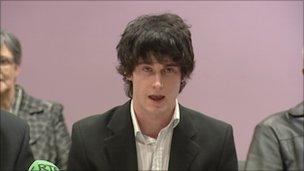McGurk's bomb ombudsman report: Baggott criticised
- Published
A man who lost several relatives in the 1971 McGurk's bar bombing has hit out at the chief constable for failing to apologise for the RUC investigation.
On Monday, the Police Ombudsman published a report into the attack claiming the original police investigation was "biased".
Afterwards, PSNI chief Matt Baggott said he believed all lines of enquiry had now been exhausted.
Chris McGurk said Mr Baggott's response was unacceptable.
'Victory and vindication'
The bomb exploded at the bar at Great George's Street in north Belfast killing 15, including three women and two children, and injuring more than 16 others.
In the aftermath, RUC officers briefed politicians and the media that the atrocity was an IRA 'own goal' when in fact loyalists were responsible.
In 1978, UVF member Robert Campbell was convicted of his part in the attack.
On Monday, Police Ombudsman Al Hutchinson said the RUC was so focused on the idea that the IRA was responsible that it did not properly probe loyalist involvement.
In response, Mr Baggott said that several other reports had reached different conclusions from Mr Hutchinson.
However, he added that it was the police's "unequivocal view that none of the victims were in any way involved in causing this atrocity" and passed on his sympathy to survivors and the victims' families.
"In conclusion, no investigation is ever closed whilst there remains the possibility of new evidence," he said.
"Sadly, however, it is my view that there appear to be no further investigative opportunities available.
"At present, all lines of inquiry have been exhausted but we will discuss any future opportunities with the ombudsman."
Chris McGurk, who lost his grandmother, great uncle and aunt in the blast, said this was far short of what the families wanted to hear from the PSNI chief.
"One of the official recommendations that the Police Ombudsman makes is that the chief constable should acknowledge the pain and hurt that the police caused and he hasn't done this," Mr McGurk said.
"If David Cameron, the prime minister, can apologise in relation to Bloody Sunday, then it should not be beyond Mr Baggott to apologise in this instance."
Mr McGurk said that the families of those who died did not want their frustration at Mr Baggott's comments to "take away from the sense of victory and vindication".
"At the end of the day, the official findings are there - the police were biased and we do feel vindicated by this," he said.
Sinn Fein and the SDLP have urged Mr Baggot to meet the survivors and the families of those who died.
'Defending the indefensible'
Sinn Fein and the SDLP have urged PSNI chief Matt Baggott to meet the survivors of the 1971 McGurk's bar bomb attack.

Christopher McGurk lost his grandmother, aunt and great uncle in the blast
Sinn Fein MLA Gerry Kelly said that the PSNI chief should apologise for the RUC's conduct.
"Instead of taking this opportunity to apologise for the failed investigations, Matt Baggott used his response to tell families there appeared to be no further investigative opportunities available to them.
"What the families deserved from the chief constable was apology.
"What they got was a chief constable trying to defend the indefensible in refusing to accept the evidence of investigative bias by the RUC."
On Tuesday morning, UUP North Belfast MLA Fred Cobain said it was "galling" to listen to Mr Kelly "lecture on this issue after he spent years promoting violence".
Mr Kelly's comments have been echoed by SDLP MLA Alban Maginness who said the chief constable appeared to have rejected the finding of "investigative bias".
"His reaction is in stark contrast to that of the British Prime Minister who accepted the findings of the Saville Report into Bloody Sunday without condition.
"It is not good enough for the chief constable to be seen to cherrypick findings from the ombudsman.
"The Police Ombudsman's report is the only authoritative and definitive report by which anyone can and should rely upon."
The chief constable's comments have also been condemned by the Pat Finucane Centre and British Irish Rights Watch.
They said the victims' families "will be hurt and re-traumatised by the chief constable's statement".
"He has missed an opportunity to lift a shadow from their lives and set the record straight," they said.
- Published21 February 2011
- Published21 February 2011
- Published9 July 2010
- Published8 July 2010
- Published9 July 2010